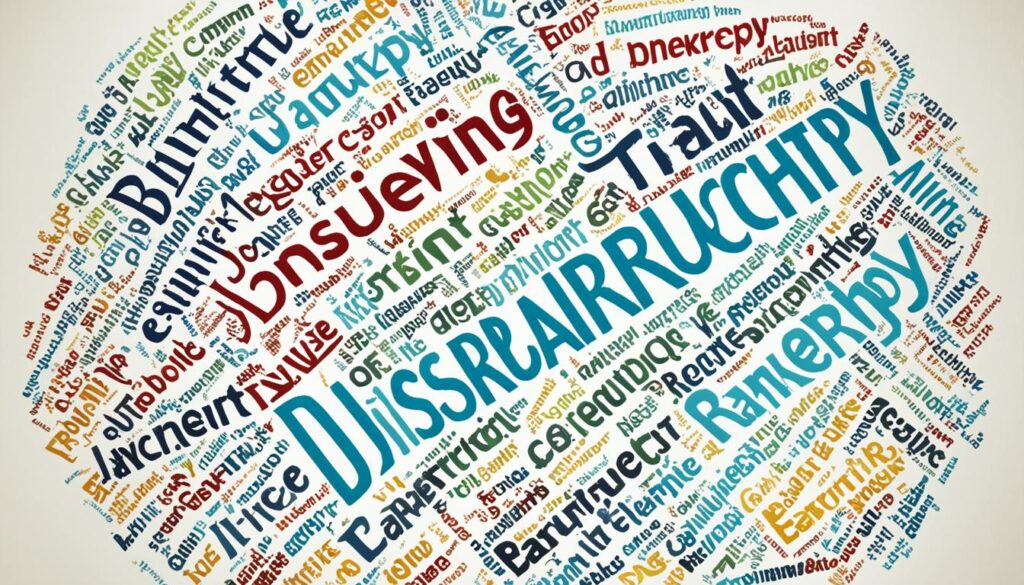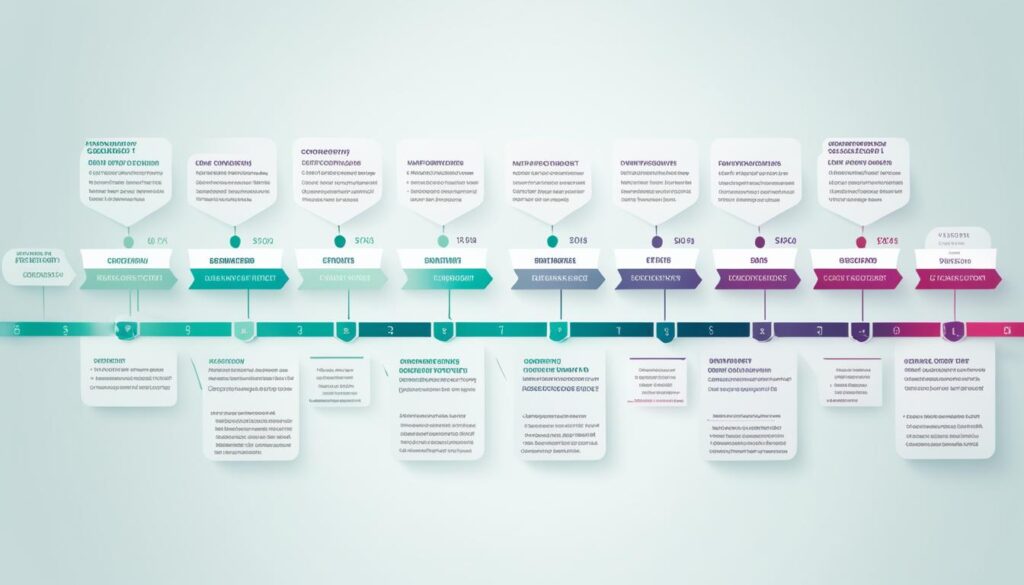Bankruptcy is tough, and its impact on your credit report can be even tougher. Many ask, “Will a dispute hurt my credit?” Understanding credit dispute impact is vital for this financial challenge.
Disputing inaccuracies in bankruptcy entries on your credit report is possible. It may be necessary to protect your financial future.
You can’t remove accurate bankruptcies. However, you have the right to challenge any errors. Credit report dispute consequences can vary, but taking action is often worthwhile.
This guide will help you effectively dispute bankruptcy entries. You’ll learn strategies to take control of your credit health.
Key Takeaways
- Disputing inaccurate bankruptcy entries is possible and important
- Credit dispute impact can vary but is often beneficial if errors exist
- Understanding your rights is crucial in the dispute process
- Accurate documentation is key to successful disputes
- Professional help, like credit repair tools, can assist in the dispute process
Understanding Bankruptcy on Credit Reports
Bankruptcy can severely impact your credit score. It’s crucial to know how it affects your report when disputing credit entries. Different types of bankruptcy have varying effects on credit disputes.
Types of Bankruptcy
Chapter 7 and Chapter 13 are the most common personal bankruptcy types. Chapter 7 involves liquidating assets to pay off debts. Chapter 13 allows for debt reorganization.
Each type affects your credit score differently. This influences the effects of credit disputes.
Bankruptcy’s Impact on Credit Scores
Filing for bankruptcy can drop your credit score by 100 to 200 points. This makes disputing credit entries more challenging. Your credit score may take years to recover after bankruptcy.
Duration on Credit Reports
Bankruptcy stays on your credit report for a long time. Chapter 7 bankruptcies remain for 10 years. Chapter 13 stays for 7 years.
During this period, credit dispute effects might be limited. The bankruptcy entry carries substantial weight in credit decisions.
| Bankruptcy Type | Duration on Credit Report | Impact on Credit Score |
|---|---|---|
| Chapter 7 | 10 years | Severe drop (150-200 points) |
| Chapter 13 | 7 years | Significant drop (100-150 points) |
Knowing how bankruptcy affects your credit report is key when disputing entries. It helps set realistic expectations for your credit score. This knowledge guides your financial recovery strategy.
Legal Rights for Disputing Credit Report Entries
The Fair Credit Reporting Act (FCRA) safeguards your right to accurate credit information. You can challenge wrong entries on your credit report, including bankruptcy records. Credit repair through disputes is crucial for financial health.

- Request free annual credit reports from major bureaus
- Dispute inaccurate or incomplete information
- Have errors investigated and corrected within 30 days
- Add a brief statement to your file if a dispute is unresolved
Credit bureaus must investigate disputes quickly. They need to fix or remove wrong information promptly. This process is key for disputing errors on credit reports and keeping a good credit profile.
If a dispute doesn’t work, you can complain to the Consumer Financial Protection Bureau. They’ll send your issue to the company and seek a response. True negative info can’t be removed, but you can add context.
Knowledge of your rights is the first step in effective credit repair.”
Knowing these legal rights helps you manage your credit history. It’s a key part of financial smarts and can greatly affect your future borrowing.
Steps to Dispute Bankruptcy on Your Credit Report
Disputing bankruptcy on your credit report requires a systematic approach. The process involves key steps to boost your chances of success. Let’s explore these steps in detail.
Obtaining Your Credit Reports
Get free copies of your credit reports from all three major bureaus. Review them for any errors related to bankruptcy listings. This forms the basis of your credit dispute strategy.
Identifying Inaccuracies
Look for mistakes in dates, account numbers, or discharge information. Check if the bankruptcy is still listed after it should have been removed. These details are crucial for your dispute.
Gathering Supporting Documentation
Collect all relevant documents to support your case. This may include:
- Court records of your bankruptcy filing
- Discharge papers
- Any correspondence with creditors
Contacting Credit Bureaus
Contact each credit bureau reporting the inaccurate information. You can dispute online, by mail, or phone. Clearly explain the errors and include copies of your supporting documents.
“A well-organized dispute can significantly improve your chances of correcting errors on your credit report.”
The credit dispute process takes time and patience. Stay persistent and follow up regularly. This ensures your rights are protected and your credit report is accurate.
Common Reasons for Disputing Bankruptcy Entries
Bankruptcy can heavily impact your credit score. Sometimes, entries on your report may be wrong. It’s vital to dispute these errors for a healthy credit profile.
You might worry if a dispute will hurt your credit. However, it’s crucial to fix incorrect information quickly.

Identity theft is a common reason to dispute bankruptcy entries. If you see a filing that isn’t yours, contest it right away.
Incorrect filing dates are also worth challenging. Bankruptcy should only show on your report for a set time. Outdated entries need removal.
Discharged debts still showing as active are another valid dispute reason. These debts shouldn’t appear as outstanding on your report.
This credit report dispute can greatly improve your credit standing. Make sure you have solid grounds before starting a dispute.
Unfounded disputes may have negative consequences. They could cause issues with credit bureaus or lenders.
- Identity theft-related bankruptcy entries
- Incorrect filing dates
- Discharged debts listed as active
- Bankruptcies reported beyond the legal period
Understanding these reasons helps you maintain an accurate credit report. Addressing errors quickly can help rebuild your credit faster after bankruptcy.
Will a Dispute Hurt My Credit?
Credit disputes can affect your financial health. Understanding their impact helps you make smart choices. Let’s explore how credit disputes influence your credit score.
Short-term Effects of Disputes
Filing a dispute may cause a brief dip in your credit score. This happens when the disputed item gets flagged on your report. Don’t worry, though. It’s usually temporary and normal.
Long-term Impact on Credit Scores
The lasting effects of credit disputes depend on the outcome. A successful dispute removing wrong info can boost your score. If unsuccessful, your score typically bounces back to its previous level.
Potential Benefits of Successful Disputes
Winning a dispute can lead to positive results. Your credit score might rise if negative items are removed. This can open doors to better loan terms and higher approval odds.
| Dispute Outcome | Potential Credit Score Impact | Other Benefits |
|---|---|---|
| Successful | Increase of 50-100 points | Better loan terms, higher approval rates |
| Unsuccessful | No change | Cleared up confusion about report items |
| Partial success | Slight increase | Improved credit report accuracy |
The main goal of disputing is ensuring your credit report’s accuracy. Short-term changes might occur. However, a correct credit report often brings long-term benefits that outweigh brief setbacks.
The Credit Dispute Process: What to Expect

Understanding the credit dispute process is vital. It starts when you file a dispute with credit bureaus. By law, they must investigate within 30 days.
Credit bureaus contact creditors to verify disputed information. They may ask you for supporting documents. Stay proactive and follow up regularly on your dispute’s status.
Possible outcomes of the credit dispute process include:
- The information is verified as accurate and remains on your report
- The disputed item is found to be inaccurate and is corrected or removed
- The creditor fails to respond, and the item is removed from your report
If your dispute is rejected, you can still act. You have the right to add a brief statement to your credit report. This can help when lenders review your credit history.
“The credit dispute process can be complex, but it’s a powerful tool for consumers to ensure the accuracy of their credit reports.”
File separate disputes with each credit bureau if needed. The credit dispute process may seem challenging. However, with persistence and proper documentation, you can effectively challenge inaccurate information.
Strategies for Effective Bankruptcy Disputes
A solid credit dispute strategy is crucial for challenging bankruptcy on your credit report. Effective approaches can boost your chances of success in credit repair.
Provide Detailed Evidence
Thorough documentation is key when disputing bankruptcy entries. Gather all relevant financial records, court documents, and correspondence. This evidence forms the backbone of your dispute.
Strong documentation increases the likelihood of a favorable outcome. It shows you’re serious about resolving the issue.
Follow Up Regularly
Persistence is vital in credit repair through disputes. Keep track of dispute timelines and follow up with credit bureaus promptly. Regular communication demonstrates your commitment to resolving the matter.
Consider Professional Assistance
Bankruptcy disputes can be complex and overwhelming. Seeking help from credit repair experts might be beneficial. These professionals can guide you through the process.
Expert assistance can potentially improve your chances of success. They know the ins and outs of the system.
| Dispute Strategy | Benefit | Potential Challenge |
|---|---|---|
| Detailed Evidence | Strengthens dispute case | Time-consuming to gather |
| Regular Follow-ups | Keeps dispute active | Requires consistent effort |
| Professional Help | Expert guidance | Additional cost |
Successful credit repair often involves combining these strategies. Solid evidence, diligent follow-ups, and professional help can improve your chances. These steps can help you effectively dispute bankruptcy on your credit report.
Conclusion
Disputing bankruptcy on your credit report is a serious matter. Filing a dispute doesn’t directly impact your credit score. However, the credit report dispute consequences can lead to score changes, depending on the outcome.
Know your rights and approach the dispute process carefully. Gather all necessary documents and be ready for a potentially long process. Successful disputes can improve your credit standing.
Disputing inaccurate bankruptcy information is just one step in managing your finances. Focus on building positive credit habits for long-term success. Regular credit monitoring and responsible practices are crucial for a healthy credit profile.

